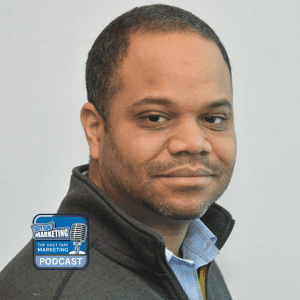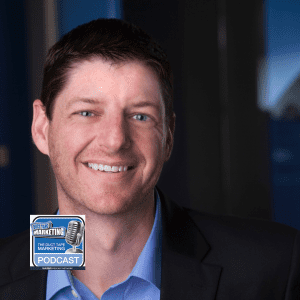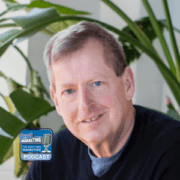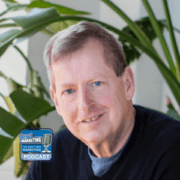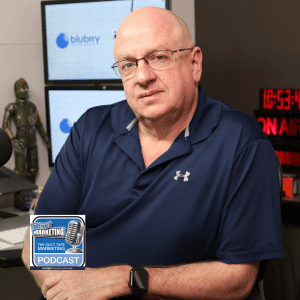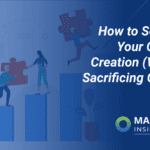How SEO Has Evolved Over The Years
How SEO Has Evolved Over The Years written by John Jantsch read more at Duct Tape Marketing
Marketing Podcast with Dale Bertrand
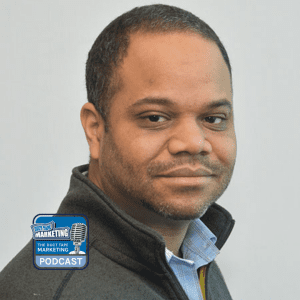 In this episode of the Duct Tape Marketing Podcast, I interview Dale Bertrand. Dale has been an SEO specialist for fortune 500 companies and venture-backed startups around the world for two decades. He speaks at industry conferences, leads, corporate training events, and serves as entrepreneur in residence at the Harvard Alumni Entrepreneurs Organization.
In this episode of the Duct Tape Marketing Podcast, I interview Dale Bertrand. Dale has been an SEO specialist for fortune 500 companies and venture-backed startups around the world for two decades. He speaks at industry conferences, leads, corporate training events, and serves as entrepreneur in residence at the Harvard Alumni Entrepreneurs Organization.
![]()
![]()
Key Takeaway:
Foundationally, what Google is trying to do is help people find the right information — the answer to their questions. As technology and algorithms are constantly changing, the world of SEO as we know it continuously evolves along with it.
In this episode, I talk with long-time SEO specialist for Fortune 500 companies and venture-backed startups, Dale Bertrand, about the evolution of SEO and where it stands today, the biggest changes happening, and what you need to do to build trust, increase authority, and rank high today with Google.
Questions I ask Dale Bertrand:
- [2:01] What are some of the biggest changes in SEO that you are following?
- [4:56] Could you talk about something you’ve written about — the end of technical SEO?
- [5:43] Do things like keywords in your titles, metadata, and your URL matter anymore?
- [9:14] What’s the value of backlinks today?
- [11:41] Do you see it that it is almost like three disciplines of content?
- [15:36] Human influence and desire haven’t changed, they’re just on different journeys. Would you say that we just need to remember those principles and apply them to today’s technology?
- [18:04] How should companies go about finding and activating the right influencer?
- [19:15] On SEO-related sites, how valuable are signals in social media — meaning people linking to you on social platforms like Twitter?
- [20:41] Where can people find out more about Fire & Spark and the work that you’re doing?
More About Dale Bertrand:
- His agency — Fire & Spark
- Contact – Dale@fireandspark.com
Take The Marketing Assessment:
- Marketing Assessment
Like this show? Click on over and give us a review on iTunes, please!
John Jantsch (00:00): Today’s episode of the duct tape marketing podcast is brought to you by blissful prospecting, hosted by Jason bay and brought to you by the HubSpot podcast network host Jason bay dives in with leading sales experts and top performing reps to share actionable tips and strategies to help you land more meetings with your ideal clients. Recently, they did a show on the four day work week. I’m a huge fan. I think everybody should be looking towards trying to create that, Hey, we get most of our work done in like two hours every day. Anyway, so let’s try out the four day work week. All right, listen to blissful prospecting, wherever you get your podcasts.
Hello and welcome to another episode of the duct tape marketing podcast. This is John Jantsch. My guest today is Dale Bertran. He has been an SEO specialist to fortune 500 companies and venture back startups around the world for two decades. He speaks in industry conferences, leads, corporate training events, and serves as entrepreneur in residence at the Harvard alumni entrepreneurs organization. So Dale, welcome to the show.
Dale Bertrand (01:15): Well, John, welcome to, well, thank you
John Jantsch (01:21):
Dale Bertrand (02:09): Well, thinking of it as an evolution is definitely the right way to think about it. When I started with SEO, believe it or not was in 1999
John Jantsch (02:58): Well. And I think, think you can test this for yourself. I mean, you start doing a search anymore and on nine times outta 10, they know what you’re searching for before you finish.
Dale Bertrand (03:08): Yeah. They’ve got the data. I mean, they process billions of searches a day and every time you interact with Google, every time you enter something into it or click on a result, it’s watching you and Google’s using that to, to basically serve up better rankings.
John Jantsch (03:22): Yeah. And it really, you know, a lot of times people look at SEO as a way to trick Google, I guess. I mean, and that’s kind of how we used to look at it right. In some ways. And really the thing people forget is Google doesn’t care about us or our SEO or our websites. I mean, they’re trying to serve their customer, right?
Dale Bertrand (03:45): Yeah. That’s really important. And I think how you frame SEO and how you think about it matters a lot. So if you understand that you are trying to help Google serve its audience, it’s searchers, right. Help by giving Google the content that it needs. If you’re writing, let’s say you’re writing a recipe for a Manhattan or any other bourbon drink, right? Like Google has already has access to thousands and thousands of recipes for Manhattans. So like you’re just not giving it something useful. So that’s one way to think about it. And then the other part of it
John Jantsch (04:16): Is, you know, it’s only two, o’clock where I am Dale, but Manhattan sounds really good. I’m sorry, go ahead.
Dale Bertrand (04:21): I should a drink cocktail mixed box before this. So we could really have some fun and record it at the same time. So the other way people think about SEO is whether it’s like a technical discipline. Like people think of, well, I’m optimizing my website, so I’m moving the HTML tags around or moving the elements around or, um, adding words like adding my keywords and, and that’s, what’s gonna make all the difference. And that’s really the biggest change that we see with the evolution that Google’s undergone as they switch to AI algorithms.
John Jantsch (04:54): So, so I taking this directly from something you’ve written the end of, uh, technical SEO. This doesn’t mean SEO’s dead. It means that your SEO resources are better spent optimizing for your customers, not Google’s algorithm.
Dale Bertrand (05:08): Absolutely. So Google’s algorithm is trained to find the right content to find the content that your customers are looking for when they’re making a buying decision. So the better, you know, your customers, uh, the information they need, the questions they’re asking and then how to answer those questions and give them the information they need to facilitate the purchase. Well, hopefully they buy from you
John Jantsch (05:41): Does do things like keywords in your titles and metadata and your URL to have a keyword. I mean, does that stuff not matter anymore because they it’s know what it says.
Dale Bertrand (05:51): It’s not that it doesn’t matter. Like it it’s just that it, it makes it harder and easier at the same time. Like it’s simple, but it’s hard to do like, you know, just creating the right content, creating the content that your, um, customers are looking for, but you can really boil it down to a three step process. Like the first one is building your platform. So making sure that there isn’t anything very broken about your website that would prevent Google from calling your indexing, your content. So that doesn’t mean you’re optimizing for, to get the last millisecond of page feed
You’re even making sure that, you know, you, you have, you have misspellings or synonym and all of that. Like it, it’s really more about the intent behind the keywords. You want people, you want purchased intent keywords. So yeah, whatever you sell, you wanna make sure these are keywords that people are typing in. When they’re trying to decide, you know, what they’re gonna buy in that category. And, and then the third step is really building targeted content and what I call multifactor authority. So the targeted content is the right type of content around the intent behind those keywords that you identified in the first step. And that could take a number of different forms, but it really depends on what you’re selling and what your customers are looking for. So remember you need to know your customers. And then the other part, multifactor authority is proving to Google that you have the answer.
So if I’m writing about I’m making something up here, non-alcoholic drink recipes or something like that because I sell non-alcoholic, um, spirit. Then Google needs to believe that we are the brand. We’re the website that that information should be coming from. And so that’s back links, that’s engagement with the site, reducing your bounce rate, making sure that when people come to your site, they stay, cuz Google will notice if they just bounce directly back to Google’s, uh, search page and then the company you keep matters. So like if you were selling non-alcoholic drinks, you could imagine that there are a number of medical organizations or mothers against drunk driving that would care about the mission behind your product. And you wanna make sure that Google can see that you’ve got endorsements of all types. You could imagine from authoritative folks in your space.
John Jantsch (08:10): And now let’s hear from a sponsor, running a small business means doing it all. You deserve an online marketing platform that does the same. Semrush is an all in one platform that will lighten the load handle SEO, social media, and advertising all in one place, attract new customers, save time and money on marketing and get ahead of the competition. If you need it online marketing, no problem. Semrush will get you started. If you’re ready to grow online, try some rush free@somerush.com slash. Now that’s S E M rush.com/now.
And I know the answer to this, but you know, I’m just gonna tee it up for you. Okay. So some might interpret what you just said is getting back links, but you’re talking about something much deeper, aren’t you?
Dale Bertrand (08:56): Yeah. So back links are still important and you know, we work to get white hat, you know, to sorry. We work to earn back links, um, on our projects. So that could be PR, but a lot of it is just making sure that you’re running a good business. So you’ve got customers that are raving about you. You’ve got products worth writing about, and your business is making an impact with your customers or a community or something, uh, where Google can see that you’re gaining traction. So, so that’s why it goes beyond back links. Because if you think about it back links are really a proxy for something. There are proxy for endorsements in your space, in your market. The, if you’re, maybe you’re in the medical space and you’ve got the Mayo clinic, you know, writing about you, you might have a partnership with them. And an artifact of that is the fact that they’re linking to you.
John Jantsch (09:42): Yeah.
Dale Bertrand (09:43): Yeah. So, so we wanna start on, we wanna start with the run, a good business, make good friends, you know, make you earn those endorsements. And then once, once we have that, then we’re looking at ways to translate those into technical artifacts on the web that Google can see.
John Jantsch (09:58): And, and certainly one of the things that they can see better than ever is that they’re the right links, right? There’s they’re links back links. That make sense. That would be logical, that would actually contribute to the conversation.
Dale Bertrand (10:21): Oh, longer than that. So I, I should know because we, I mean, I was doing, I’ve been doing SEO for a very long time. So there used to be black hat techniques that worked and, and we did it because it worked nowadays. It just, they have to be natural links. Like you really do need to be building a community around your brand and, and content. A lot of it depends on whether you’re B2C or B2B. If you’re B2C, you wanna build a community, um, around your brand, get traction and make sure Google can see it. And then if your B2B, then the number of searches is gonna be lower is just gonna be lower volume, but still they’re gonna be valuable. Organic traffic is valuable. But in that case, it’s more that you want to make sure that Google can see the company you keep so that you’re, you’ve got relationships with the industry, trade organizations and conferences. And if you’re in the medical space, it’s PhD, sorry, MDs or MD PhDs, which is even better and what, whatever works in your industry.
John Jantsch (11:15): So there’s really a lot of elements here. I mean, there is the technical aspects of content of website that, that lead to SEO. There’s the, the actual good deep content itself. But then in a way it’s actually promotion of that content
Dale Bertrand (11:44): I, I try. So, yes, but I try not to. So when it comes to like a, a successful SEO campaign, there’s gonna be a lot of elements. Like you said, the technical platform, keyword research, the customer research, the content, and then the authority building. And then there’s, you know, there’s PR within that, there’s a lot of dis disciplines within that, but it’s really hard, especially for small business owners to think about, um, to, to even, you know, have the courage to do SEO when it requires so much. So instead. And, and I, I think I’ve learned about this, John sitting next to you at a dinner a long time ago, where you, you kind of helped me simplify some of my ideas, the way that I like to think about it. We, you have a purpose behind your SEO. And, uh, what I mean, when I say you have a purpose behind your SEO is that you’ve got a purpose behind your brand, a purpose behind your business. Yeah. And, and a quick example I’ll give you is that we worked with a company that was a manufacturing company and what they manufactured was Velcro straps. It’s, it’s pretty darn boring. And I hope they’re not listening to this cause they get excited about manufacturing. It’s run by two engineers. And these Velcro straps are used by electricians. If you’re installing bundles of wires into a big building, you need a lot of these Velcro straps to make sure that it’s not spaghetti of wires everywhere.
John Jantsch (12:56): I got a few of ’em here with all my technology that hook up here.
Dale Bertrand (13:00): Perfect, perfect. And for them, we, they wanted to do SEO. They wanted to build content, but what were they gonna do? They gonna write 50 articles about Velcro. Like, Hey, Velcro’s awesome. For all these reasons, we’ll write one article about each reason. So you could do that, but it’s not gonna help you build a community, build authority and have Google see that you’re gaining traction. So what, what we realized when we were talking to them is one of the founders of this company was he was volunteering weekends at a technical high school near, near where, um, they’re located. And so what we did was we put together a campaign. We called it the campaign to recruit the next generation of electricians. And basically it was, you know, they were going to identify, it was young people, help them pay for some exams, some licensure and, and also help them put a little bit of money towards their schooling.
And what we did was we promoted that campaign. We said, Hey, if you care, and we reached out to like-minded organizations like organizations that care about providing, you know, job opportunities for young people. And there was one that was about finding job opportunities for recently incarcerated people. And we told them like, we’re looking for kids to help. Could you help promote this campaign? And basically when we look at it that way, and the reason why I call it purpose driven SEO, is because we wanna find something behind our brand that we can promote and build a campaign around. And then we get all of those other artifacts of SEO, the, the content, the technical platform, the traction, the links, the authority building the, the endorsements of like relationships with other organizations that are helping us promote our campaign. We get all of that by just focusing on this one purpose. So that, that’s why I like to think of, uh, SEO campaigns as like purpose driven SEO campaigns. Yeah.
John Jantsch (14:44): And, and I love that. And before people think, oh, I have to learn this new, you know, tactic or this new technique. What you just described is what people like me were doing in the eighties. Right? Yeah. It was just PR and community building, but we pitched a newspaper, you know, or we went out to a nonprofit agency and got them, you know, to partner. What? So, so the more things changed, the more they say the same, I mean,
Dale Bertrand (15:09): Yeah, yeah.
John Jantsch (15:10): Human influence hasn’t really changed or what people’s desires are or what lights them up. Hasn’t changed. We just have to figure out now they’re on different journeys. They’re, they’re in different platforms, they’re in different places. They get their information differently. And we just have to, we have to just remember those principles. Yeah. And then apply it to the technology. Don’t we,
Dale Bertrand (15:30): And then also realized that there was a hiccup in the fabric of time in the marketing space. Yeah. Where all of a sudden these technical people, I have a technical background. I was a programmer before I started doing SEO, but technical people for all of a sudden had all this value because the web came along. Right. And if you could optimize a website just right, or get your programmer to do it, you would get tra traffic from Google. Yeah. And, and those days are, are really behind us. Yeah. Where like Google’s AI has gotten to the point where it understands when a brand is building traction or, or if you like sell a B2B service or something like that. When you have endorsements in relationships with folks in your space that makes you worthy of organic traffic and rankings. Yeah. So now Google’s getting like, just getting so good at what they do that we’re reverting back to actually generating the, the right content that your customers are looking for and proving to Google that you’re authoritative in your space.
John Jantsch (16:26): So that example that you gave you, you give that a name or at least a point of view, which I think people I’d love for you to kind of riff on this a little bit, because I think people need to acknowledge this and, and think about this more and you call it promoting the story, you know, not promoting your content or not promoting your products or your, you know, webpages or whatever, but promoting kind of the whole story, which to me was that was the technical, you know, school, you know, story that, that people got interested in and the byproduct was you got links and you got traffic and you got eyeballs.
Dale Bertrand (17:03): Yeah, exactly. That’s what Google is, is looking for. So just think of it as like brands that are building traction or building like an audience. Yeah. And if you can show that initial uptick, then Google will give you the rest of the traffic and kind of have to help you go along that trajectory help you grow along that trajectory.
John Jantsch (17:21): So one of the elements of this kind of authority ideas is actually finding and activating influencers. I mean, people that you, you know, we all think about the, oh, you know, the top 10 names, every single person can name. Sure. We want them to talk about us and our stories and, uh, content. But you know, for that you’re Velcro person, Gary V talking about, them’s probably not gonna really do ’em much good. You know, how, how does the Velcro, you know, manufacturer go out there and find the right influencers to, to talk about their story.
Dale Bertrand (17:51): So what you would love is if it was your customers and it depends a lot of it depends on what you sell. So you could be in a consumer space where you’re basically, um, you’re basically incentivizing your customers to, to be brand evangelists and talk about the products, review the products, whatever you can do to get them to do that would work. It could be an ambassador program. And then in the B2B space, it, it might not be your customers. A another example I’ll give is we work with a 3d printing company that sold, you know, multimillion dollar high-end 3d printers, but there’s just not enough customers
John Jantsch (18:49): So I, I have kind of one final question that, and I’m just curious your opinion on this, cuz there’s a lot of various opinions, you know, on, on SEO related sites, how valuable are signals in social media. So people linking from Twitter, people talking about your brand from a pure SEO standpoint, how valuable are those?
Dale Bertrand (19:11): So there’s two answers, both are correct, which is the direct value of the links in the mention is not valuable. Yeah. But we still use social media as a tool for PR, which helps us build relationships, get back links on, on websites that Google can see stuff like that. And we know that it’s not valuable cuz short version of the story, Bing had tried to use social media instead of back links because Google started out, you know, really focused on back links to determine authority in the best websites. And when Microsoft started its search engine, they said, ah, we’re gonna do it better. We’re gonna rely on social media and it just didn’t work. Yeah. So they abandoned it. They went to links just like Google and now Google and, and Microsoft are both trying to figure out how to incorporate social signals. But uh, apparently what we see in the research is that it it’s just not, it’s just not good. Like it doesn’t help them identify the best content, the same way back links, engagement, and these other artifacts of real world relationships do.
John Jantsch (20:15): So Dale tell people where they can find out more about fire and spark and uh, the work that you’re uh, doing.
Dale Bertrand (20:21): Yeah. So we’re at fire and spark.com all spelled out and you can email me directly Dale, D a L E fire and spark.com um, all spelled out. And um, always, I love talking about SEO. So if anybody has any SEO questions, I’m, I’m happy to hear it.
John Jantsch (20:37): Awesome. Well, I appreciate you taking a moment to stop by the duct tape marketing podcast and hopefully we’ll see you out there on the road again, maybe in beautiful state of Maine.
Dale Bertrand (20:46): Awesome, John, and thank you for the
John Jantsch (20:48): Opportunity. Hey, and one final thing before you go, you know how I talk about marketing strategy strategy before tactics? Well, sometimes it can be hard to understand where you stand in that what needs to be done with regard to creating a marketing strategy. So we created a free tool for you. It’s called the marketing strategy assessment. You can find it @ marketingassessment.co not .com .co check out our free marketing assessment and learn where you are with your strategy today. That’s just marketingassessment.co I’d love to chat with you about the results that you get.
Sign up to receive email updates
Enter your name and email address below and I’ll send you periodic updates about the podcast.
This episode of the Duct Tape Marketing Podcast is brought to you by the HubSpot Podcast Network and Semrush.
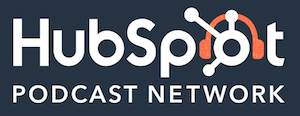
HubSpot Podcast Network is the audio destination for business professionals who seek the best education and inspiration on how to grow a business.
![]() Running a small business means doing it all. You deserve an online marketing platform that does the same! Semrush is an all-in-one platform that will lighten the load. Handle SEO, social media, and advertising all in one place. Attract new customers, save time and money on marketing, and get ahead of the competition. New to online marketing? No problem! Semrush will get you started. If you’re ready to grow online, try Semrush free today at semrush.com/now.
Running a small business means doing it all. You deserve an online marketing platform that does the same! Semrush is an all-in-one platform that will lighten the load. Handle SEO, social media, and advertising all in one place. Attract new customers, save time and money on marketing, and get ahead of the competition. New to online marketing? No problem! Semrush will get you started. If you’re ready to grow online, try Semrush free today at semrush.com/now.
Did you miss our previous article…
https://www.sydneysocialmediaservices.com/?p=2019

